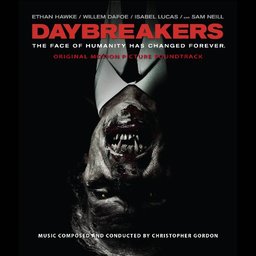
2009’s Daybreakers, a science-fiction horror film by the Spierig Brothers, had a truly creative concept. What if, in a not too far off future, vampires had replaced humans as the dominant species on earth? In such a world, human blood would increasingly become a rare luxury. The world that the Spierig Brothers have envisioned poses just this question and explores how the vampiric race would deal with their potential extinction when the last drops of blood run out and the few remnants of humanity begin mounting a resistance. Fantastic production design and a convincing atmosphere allow Daybreakers to succeed in part, especially considering its low budget, but the film was ultimately a case of a missed opportunity. Though highly original in concept and stylish in execution, Daybreakers nevertheless left the viewer with the sense that a bigger budget, an extra half hour, and a more complicated narrative could have made the film so much more.
Scoring Daybreakers was one of the unsung talents of Hollywood, Australian-born Christopher Gordon. Best known for his scores for the 1998 adaptation of Moby Dick, the 2000 remake of On the Beach, and the brooding, 2003 swashbuckler Master and Commander, Gordon is a composer who has affirmed his orchestral abilities time and time again. He brings this orchestral finesse to the table yet again with Daybreakers, even if his moments of brass-laden mastery are largely kept secret until the score’s stunning concluding tracks.
Opening with the morose "Immolation", Gordon serves up tragic gothicism on a grand scale with a commanding string build-up. The orchestral work found in "Immolation" is quickly abandoned in favor of a brooding, wandering, choral-led ambience piece in "Nightfall'. Such stark contrasts between orchestral power and subtle ambience are the score’s biggest issues as a listening experience. While effective in the film, on album these vacuous expanses can be harder to digest. "Humans" presents a somber identity for the harvested remnants of humanity over almost undetectable electronic beats, while the following "Subsider" plunges the score back into its ambient choral soundscapes before giving a minor taste of the ferocious percussive work to come in the next cue.
"On the Run" marks what is perhaps the score’s third identity (besides powerful orchestral statements and chilling ambient meanderings): its ferocious percussive work. Drums slam and crash fiercely with propulsive sonic force before a rather abrupt change of pace sees the cue exploring some quiet mystery material. "Blood Lust" continues the quiet, ambient orchestral and choral meanderings for a challenging seven and a half minutes. The most recognizable theme of Christopher Gordon’s Daybreakers appears at the beginning of the next cue, "The Winery and the Café". It’s a warm, noble identity for the remaining survivors of humanity and gains prominence as the score goes on before dominating the final cues. A somewhat somber blend of lush strings reprises it in "Fermentation Tank", before a crescendo of beautiful string work and a brief horn statement at 1:50 that hints at what’s to come.
In an even more aggressive mix than "On the Run", "Ambush" returns to the score’s fierce percussive side and later adds strings to the mix. The powerful, slow-building "Resurrection" stands out with more strings lending gravity while light drums propel the cue forward. The three-note rising motif at 1:07 builds and falls with a sense of wonder and weight. The piercing brass of "Drought" follows that highlight cue up with a difficult listen, not helped by the effective but directionless choral moans and screeches. "In the Sun" and "Blood Brothers" continue this trend by oscillating between difficult and dull. It’s a shame that these cues, while certainly chilling and effective in film, don’t drum up much interest on album compared to Gordon’s larger orchestral work.
The concluding cues "Spreading the Cure" and "Daybreak" offer a fantastic suite of Gordon’s Daybreakers and easily constitute the best 17 minutes of the album. In particular, the two minutes from 5:09 to 7:19 of "Spreading the Cure" stand out as truly glorious brass work intricately interweaves the theme for humanity with the three-note motif introduced in "Resurrection". Wailing trumpets at 8:10 and a stirring ostinato-led progression at 9:47 are among the cue's other strengths, helping it become one of the most impressive tracks of 2009. "Daybreak" is another highlight and a beautiful, closing reprise of the main theme for humanity, again intricately interwoven with the three note rising and falling motif.
The last inclusion in Daybreakers isn’t Christopher Gordon’s but English, alternative-rock band Placebo’s. A dark, grungy reworking of Kate Bush’s song, Placebo’s "Running Up That Hill" is a great fit for the tone of the film.
Christopher Gordon’s Daybreakers is a strange beast. On one end, it features effective but nondescript horror material while, on the other end of the spectrum, it boasts some of the most commanding orchestral work of 2009. The fluctuation between the two extremes, however, may make for a disjointed, challenging listen. Indeed those looking expressly for Gordon's fantastic orchestral displays in "Spreading the Cure" and "Daybreak" may want to skip over the score's more vacuous portions. As a whole, though, Daybreakers is still an impressive, large-scale, gothic creation and more than worth a listen.
| A Few Recommended Tracks: "Immolation", "Resurrection", "Spreading the Cure", "Daybreak" Label: Lionsgate Records Availability: 16 track edition | |

 RSS Feed
RSS Feed
